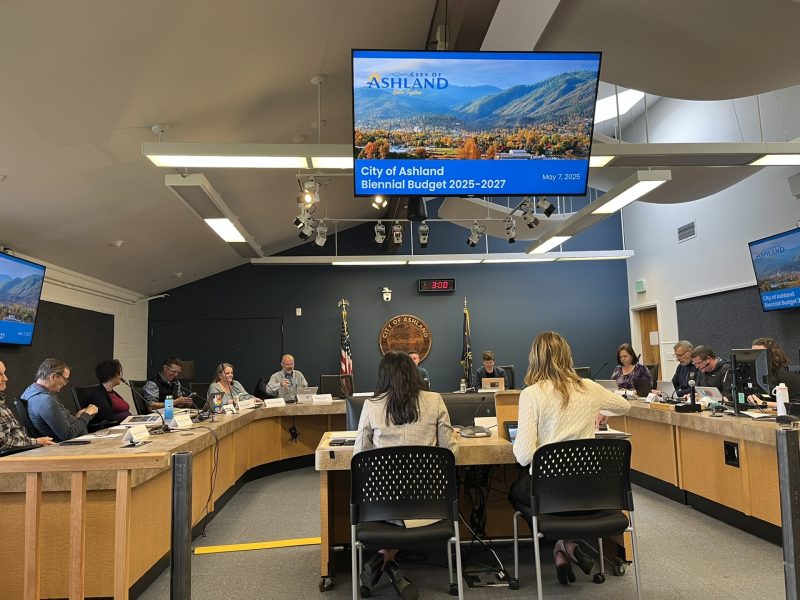Ashland committee recommends $373M biennial budget that staves off drastic parks cuts
Published 12:29 pm Friday, May 16, 2025

- Ashland Citizens’ Budget Committee recommended a $373 million biennial budget Wednesday. Ashland.news photo by Damian Mann.
Recommendations include a $5 fee increase on utility bills for parks funding
The Ashland Citizens’ Budget Committee Wednesday recommended a $373 million biennial city budget that avoids drastic cuts to parks and throws a lifeline to a preschool grant program.
If the recommended budget is approved by the City Council, Ashland homeowners will see a $5 increase in fees on their utility bill starting in July that will provide $1.4 million to prevent cuts to parks. The fee is set to expire in 24 months.
Councilor Eric Hansen, a budget committee member, supported increasing fees for parks that are “loved by tourists but also by Ashlanders.”
Budget Committee Member Linda Peterson Adams said the parks operations are “one of the most vital threads that holds Ashland together.”
A program that provides grants for families who want to put their children into preschool, specifically at the YMCA, also got a $235,000 lifeline. The budget committee debated how to fund the $235,000, which had been one of many programs on the chopping block. After considering various options, the committee decided to recommend dipping into reserves.
“I don’t love taking money out of reserves,” said Councilor Bob Kaplan, a member of the budget committee.
“We’re in a childcare desert,” Mayor Tonya Graham said, pointing out that the options for childcare are limited in Ashland.
Councilor Dylan Bloom said conversations are currently underway to seek an endowment that would provide the ongoing funding for the childcare program.
All but one member of the budget committee supported the proposed budget, which faced budget pressures from increasing labor and benefit costs. Councilor Gina Duquenne, who cast the only “no” vote on the budget, said she could not support a $5 to parks fee hike in addition to other fee increases because it is asking too much of Ashland residents. She said she looks at the parks budget as a “money-management concern.”
“We’re just throwing money at a situation without accountability,” she said. “I can’t support that.”
Duquenne said these fees come on top of the construction of a new water treatment plant that the city will be building with a price tag of up to $75 million.
“The biggest loan ever has been asked of the people of Ashland,” she said.
Other fees that would increase include those for public safety, rising from $1.50 to $5 a month, and wildfire reduction, increasing from $3 to $7 a month. A federal grant that would have paid up to $50 million toward the treatment program was canceled in April. The city is applying for a new grant from the Federal Department of Emergency Management’s Building Resilient Infrastructure Communities (BRIC) program.
Ariana Spiegler, a budget committee member, said she supports the parks fee because it expires after 24 months.
“I’m voting on it because it has a time period,” she said.
Mayor Graham said the city has built a world-class park system that needs to be maintained, while she also suggested a larger community conversation around how to support parks going forward.
Ashland will continue to face budgetary pressures, according to City Manager Sabrina Cotta, citing uncertainty about inflation, high interest rates, potential tariff impacts, supply chain issues, and fears of a recession. Uncertainty about federal and state grants remains an ongoing concern as well.
To help offset budget shortfalls, a number of changes have been made, according to Cotta. The information technology position has been eliminated and folded into the finance director’s duties. Some positions that have been eliminated include a police records’ clerk, a fire training officer, a half-time IT administrative support person, an IT user support person, and an IT analyst.
Budget committee member Michael Murray said 62% of the $100 million general fund budget goes toward salaries and benefits.
During discussions about dipping into reserves to fund the childcare grant program, Finance Director Marianne Berry said the city’s policy on the amount that should be in the reserve fund is vague. Meg Wade, budget committee member, made a motion to recommend to the council that the city establish a policy that better describes the amount of reserves needed in the budget.
The motion passed unanimously.
Councilor Kaplan said, “It’s a good idea.”
Reach writer Damian Mann at dmannnews@gmail.com. This article first appeared at Ashland.news.










